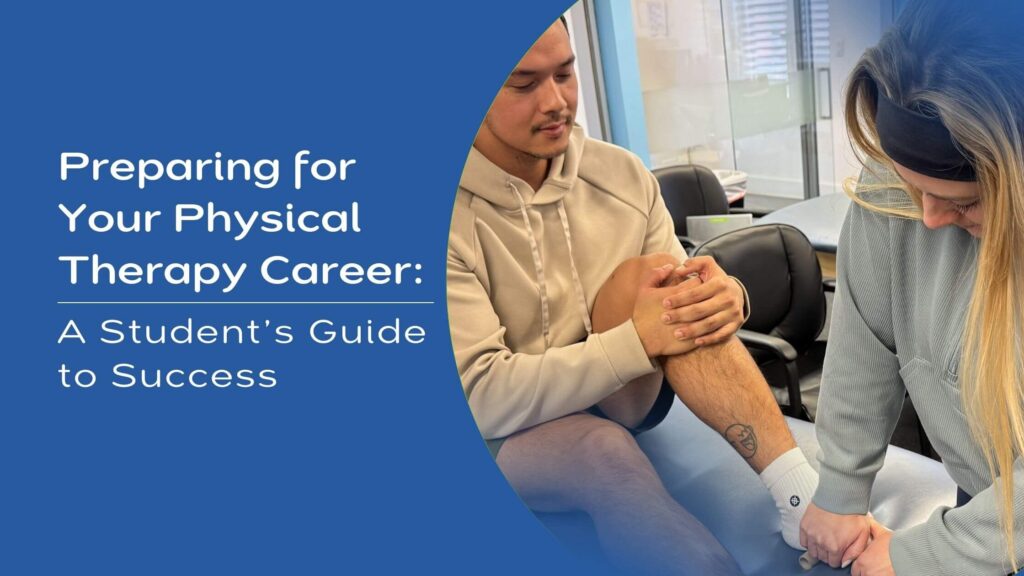
Preparing for your career in physical therapy starts before graduation. The final year of PT school is full of exams, clinical rotations, and planning for your next step. It can feel overwhelming, but building the right habits now will help you transition smoothly from student to clinician.
Here are 8 tips to help pave your path as you get ready to enter your career:
1. Build Strong Clinical Skills During Rotations
Clinical education is more than checking off hours. Treat each rotation like a job interview:
- Ask questions and seek feedback from your clinical instructors.
- Take notes on treatment strategies that work well.
- Practice documentation — accurate, timely notes are essential in patient care.
2. Start Your Professional Network Early
Your classmates, professors, and clinical instructors are the start of your professional network. These connections often open doors to job opportunities, mentorship, and continuing education. LinkedIn is a valuable tool — update your profile now to reflect your skills and experiences.
3. Get Ahead With AI Technology in Physical Therapy
AI documentation and digital tools are changing physical therapy. Learning how to apply new technology early gives you a major advantage. AI systems can:
- Streamline documentation and save valuable time.
- Provide evidence-based guidelines during patient care.
- Help you focus more on patient outcomes instead of paperwork.
As a new graduate, you’ll stand out if you’re comfortable with technology. Stay curious, ask questions about digital tools in your clinical sites, and explore how AI is being used to improve both patient and clinician experiences.
4. Learn About Continuing Education in Physical Therapy
Your PT education doesn’t stop at graduation. Continuing education is required for licensure renewal and is key to professional growth. As a new graduate, it also helps you:
- Gain confidence in specialized treatment areas.
- Stay up to date on research and best practices.
- Advance toward certifications and leadership roles.
That said, continuing education can become costly. Courses, certifications, and travel all add up quickly. If advanced learning is important to you, make sure to look for employers that offer robust in-house programs and support for external continuing education. Practices that invest in your growth will not only save you money but also ensure you always have access to the latest skills and training.
5. Align Your Career With Core Values
A fulfilling career goes beyond salary and location — it’s about finding a workplace whose mission resonates with your own. Ask yourself:
- Does this organization prioritize service to the community?
- Do their values reflect how I aspire to practice?
- Will I be challenged and supported to grow as both a clinician and a person?
When your values align with your employer’s — especially one committed to service, collaboration, and efficiency — you’ll find deeper meaning in your work and a strong foundation for long-term success.
6. Balance Career Goals With Personal Well-Being
Burnout is common in healthcare, but it’s not inevitable. Setting boundaries, managing time wisely, and finding a supportive workplace culture are just as important as mastering manual therapy or therapeutic exercise. Look for employers who value work-life balance and provide mentorship.
7. Explore Diverse Career Paths in Physical Therapy
As you prepare to launch your career, consider the many directions physical therapy can take — especially in outpatient care. Whether you’re passionate about orthopaedics, pelvic health, pediatrics, sports, or pursuing a residency, outpatient settings offer rich opportunities for specialization, autonomy, and long-term patient relationships.
Residency programs are another path for new graduates who want to build advanced expertise. They provide structured mentorship, exposure to specialty practices, and opportunities for board certification down the road. Exploring these paths early will help you discover where your strengths, values, and passions intersect.
8. Consider Travel Opportunities Early in Your Career
Many new graduates dream of exploring new places while building their careers. Internal travel programs make that possible. These programs allow you to:
- Travel and experience new regions across the country.
- Meet new teammates and friends who share your passion for PT.
- Learn from different patient populations and clinical approaches.
The best part? You can do all of this while staying with one organization, maintaining your benefits, and enjoying the stability of being part of a supportive network. Travel opportunities are not only fun and adventurous, but they also expand your clinical skills and professional connections.
Final Thoughts
Your career in physical therapy is about more than a first job. By exploring diverse paths, learning to leverage AI, aligning with core values, and seeking continuing education and travel opportunities, you’ll set yourself up for a fulfilling and impactful career.
Continue Your Journey With CORA
At CORA, we believe in lifelong learning for both students and clinicians. From mentorship and advanced education to embracing new technologies like AI, we’re here to support your growth every step of the way.
👉 Explore Student Services and Careers at CORA: https://careers.coraphysicaltherapy.com/student-services
FAQs
Q1: How can PT students prepare for their careers?
A1: PT students can prepare by focusing on clinical skills, networking, exploring inpatient vs outpatient careers, embracing AI technology, and seeking employers that support continuing education and values alignment.
Q2: Why is continuing education important in physical therapy?
A2: Continuing education keeps clinicians current, builds confidence in specialties, and helps with licensure renewal. Since it can be costly, look for practices that provide strong in-house and external learning support.
Q3: What career options exist for PT graduates?
A3: PT graduates can work in inpatient settings like hospitals or outpatient clinics. Outpatient often provides more flexibility, variety, and long-term growth opportunities.
Q4: Do PTs have travel opportunities?
A4: Yes, internal travel programs allow PTs to work in new regions, meet teammates, and learn from diverse patient populations, while keeping the stability of one organization.